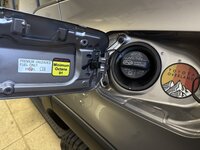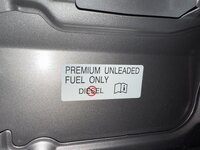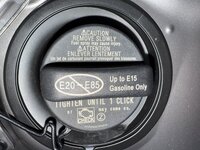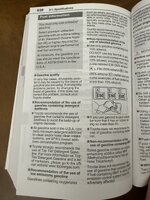Navigation
Install the app
How to install the app on iOS
Follow along with the video below to see how to install our site as a web app on your home screen.
Note: This feature may not be available in some browsers.
More options
You are using an out of date browser. It may not display this or other websites correctly.
You should upgrade or use an alternative browser.
You should upgrade or use an alternative browser.
Premium Fuel or not?
- Thread starter sbbamafan
- Start date
I think the point the youtuber was making was more to the issue that the US is one of the few countries in the world that uses a lot of 87 octane fuel.
Apparently, many countries don't even bother and skip the lowest grade. Thus, if the LC is a global product and most of the world does not sell 87 octane gas but 100% offer 93 octane gas then it is simpler to just require 93 for everybody.
Apparently, many countries don't even bother and skip the lowest grade. Thus, if the LC is a global product and most of the world does not sell 87 octane gas but 100% offer 93 octane gas then it is simpler to just require 93 for everybody.
If owner manual contradicts, then go with your common sense. E.g., owner manual says to change engine oil every 10k miles. Yet a certified Toyota Mechanic who goes my The Car Care Nut suggest to change engine oil every 5k miles or less specially for turbo vehicles.This is not true. Coming from the Ford performance world an engine tune makes a world of difference. Specific tunes are designed to extract extra HP out of the engine versus the basic stock tune. Yes, using 93 octane on a car designed to run on 87 isn’t the end of the world. Though you will have issues running 87 on a vehicle designed to run on premium. Even page 640 of the owners manual states that you could run into engine knocking using improper octane.
Also, my common sense tells me that the new 4Runner iforcemax, and tocomas runs or regular, and there’s no reason to use premium gas in the LC 250.
Here's what I don't get (and maybe you can explain it to me)...the HP and torque rating for the 4Runner and LC are exactly the same, whether running 87 in the 4Runner or 93 in the LC. Shouldn't a tune requiring higher octane also give us more HP and torque? What's the point of running a higher octane if you aren't also running a higher compression ratio and getting a boost in both torque and HP?This is not true. Coming from the Ford performance world an engine tune makes a world of difference. Specific tunes are designed to extract extra HP out of the engine versus the basic stock tune. Yes, using 93 octane on a car designed to run on 87 isn’t the end of the world. Though you will have issues running 87 on a vehicle designed to run on premium. Even page 640 of the owners manual states that you could run into engine knocking using improper octane.
LC most likely has higher hp and torque with premium fuel than what is advertised.Here's what I don't get (and maybe you can explain it to me)...the HP and torque rating for the 4Runner and LC are exactly the same, whether running 87 in the 4Runner or 93 in the LC. Shouldn't a tune requiring higher octane also give us more HP and torque? What's the point of running a higher octane if you aren't also running a higher compression ratio and getting a boost in both torque and HP?
Dyno Test: '24 Tacoma 87 vs 91 octane
Interesting results, they saw +20 hp with 91, strongly recommend it for this new engine:
I’m doing premium. I’m planning on going 250k miles in this vehicle. I don’t see any reason to chance it.
The 4Runner with the iforce max also requires 91 octane. The 4Runner also has the smaller non hybrid engine in some trim levels which takes 87 octane.Here's what I don't get (and maybe you can explain it to me)...the HP and torque rating for the 4Runner and LC are exactly the same, whether running 87 in the 4Runner or 93 in the LC. Shouldn't a tune requiring higher octane also give us more HP and torque? What's the point of running a higher octane if you aren't also running a higher compression ratio and getting a boost in both torque and HP?
Where did you see that?The 4Runner with the iforce max also requires 91 octane. The 4Runner also has the smaller non hybrid engine in some trim levels which takes 87 octane.
In the owners manual for the 4Runner it only says 87 octane with no indication that they hybrid requires the higher octane. Of course, that could just be that the manual posted online may be incorrect.The 4Runner with the iforce max also requires 91 octane. The 4Runner also has the smaller non hybrid engine in some trim levels which takes 87 octane.
In my quick peruse, I couldn't find any reference to the hybrid powertrain in that manual, so perhaps there is a separate one.In the owners manual for the 4Runner it only says 87 octane with no indication that they hybrid requires the higher octane. Of course, that could just be that the manual posted online may be incorrect.
We all paid a lot of money for this vehicle that most of us, hard to tell sometimes, love.
For me it’s a no brainer. It will be 36 months or 36K miles of premium gas because IF it craps the bed I’m not giving Toyota any opening to say it was my fault and void the warranty.
For me it’s a no brainer. It will be 36 months or 36K miles of premium gas because IF it craps the bed I’m not giving Toyota any opening to say it was my fault and void the warranty.
If that's the case, he doesn't understand octane vs RON.I think the point the youtuber was making was more to the issue that the US is one of the few countries in the world that uses a lot of 87 octane fuel.
Apparently, many countries don't even bother and skip the lowest grade. Thus, if the LC is a global product and most of the world does not sell 87 octane gas but 100% offer 93 octane gas then it is simpler to just require 93 for everybody.
(RON is the standard in most of the rest of the world, and 92 RON is the same as 87 octane).
There's lots of places around the world where 87 octane/92 RON (or lower) is the only option. There's very few places where 91 octane/97 RON is the only available option.
I'm pretty pro 87 octane being fine, but I do think there's some sense in that. Run >=91 octane through the warranty period so they can't shift blame if something goes wrong, switch over to 87 thereafter. Maybe run >= 91 when doing high load stuff (towing).We all paid a lot of money for this vehicle that most of us, hard to tell sometimes, love.
For me it’s a no brainer. It will be 36 months or 36K miles of premium gas because IF it craps the bed I’m not giving Toyota any opening to say it was my fault and void the warranty.
Someone posted to this thread quite a while ago that on his BMW (?) they were able to look at his fill up history while assessing an issue with the engine.I'm pretty pro 87 octane being fine, but I do think there's some sense in that. Run >=91 octane through the warranty period so they can't shift blame if something goes wrong, switch over to 87 thereafter. Maybe run >= 91 when doing high load stuff (towing).
So much data can be collected and stored these days. When I read that it settled it for me. Why chance it?
This might help with question on premium fuel or not, and mileage complaints. You’ll need premium food, which might be costly.
Get a male, they spin faster, hold pic of female on cage.
Just joined the forum. Got a 2025 Land Cruiser yesterday and I was really bummed when the salesman said premium gas only. I know everyone is already tired of this topic, but notice the change to the sticker. Toyota really shit the bed on the this
Attachments
yup… sorry but think a lot of us are.
How so?Toyota really shit the bed on the this
Similar threads
- Replies
- 4
- Views
- 561
- Replies
- 82
- Views
- 8K





